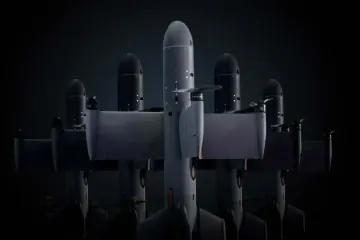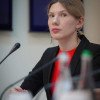- Category
- Opinion
From Nashville to Kherson. Why I Came to Ukraine
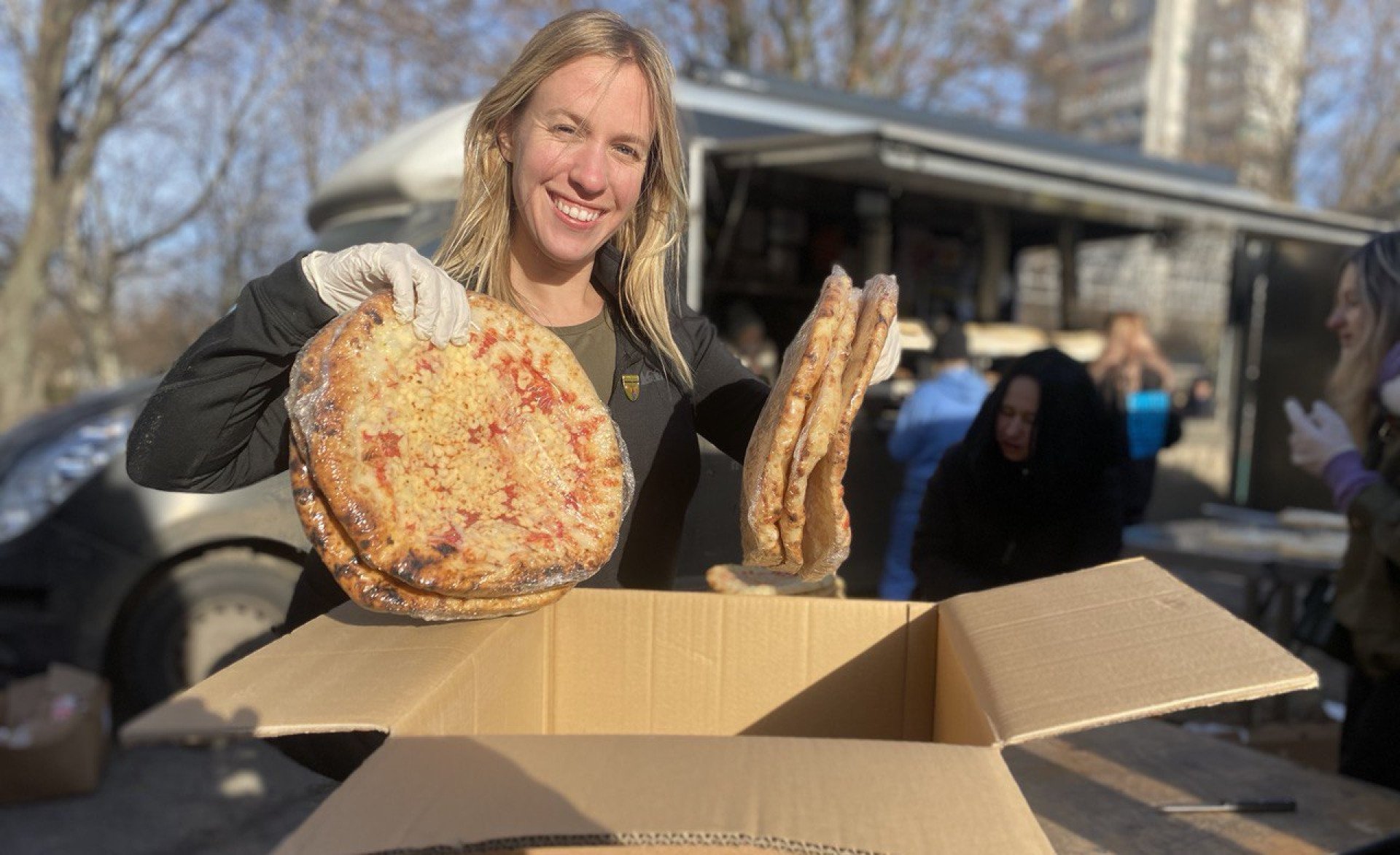
On the two-year anniversary of Kherson’s liberation, editorial writer Audrey MacAlpine reflects on her time helping the city recover from Russian occupation. See Ukraine through the eyes of a US volunteer as she shares what drove her to support a resisting nation across the ocean.
For us, it was about bringing the community together, for Russians it was an easy target.
Audrey MacAlpine
On March 2, 2022, Russian troops invaded Kherson—the only Ukrainian regional capital to be captured during the war. Within months, a Russian TV news studio was set up, Russian brands filled grocery shelves, and the ruble replaced the hryvnia. The invading forces never expected to lose their grip on the city.
Nine months later, in a swift counteroffensive, Ukrainian troops liberated Kherson in what has become one of the most pivotal moments of the war to date. Just 10 days after the liberation, the charity I was working with at the time, HopeFull, and I were granted permission to enter. The delay was necessary: Ukrainian armed forces needed time to properly handle casualties, clear the area of mines and booby traps, and search for saboteurs who may have remained behind with the intent to infiltrate Ukraine.
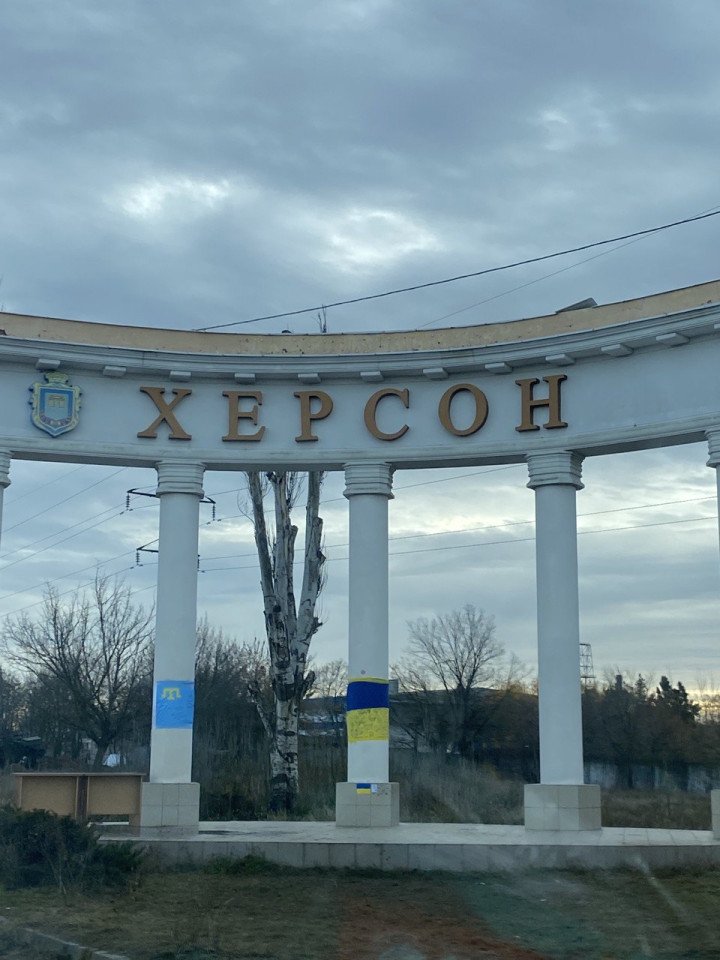
The drive into the city was as horrific as the city itself—a literal highway to hell. Bullet holes penetrated every fence and the exterior of every house as far as the eye could see. Windows and roofs were left shattered from explosions. Gas station signs dangled by their wires and an old famers market was reduced to a pile of sticks.
The road was so terrible it had caused multiple car accidents. Abandoned vehicles lined the sides of the highway, some had been left in a hurry while others appeared to have crashed into flames and reduced to an ashen frame. As we drove south that morning two army cars hit each other in a head-on collision and medics were attempting to resuscitate a lifeless body on the side of the road as we went past.
There were huge potholes where mortars had landed so you had to drive slowly and very carefully. I was glad of this when we approached an overpass that suddenly dissapeared in the middle. We said our hail mary’s and the five truck convoy reversed carefully and followed a small dirt track that had been forged beside it. Everywhere was mined and one had to be very careful not to veer too far off course.
Having been in Ukraine for just about six months, this was by far the most “grown-up” experience of my volunteer work to date. I had been to Kharkiv in July 2022, when the city was still largely empty and Russian troops loomed on the outskirts. I had sheltered in my bathtub as eleven S-300 missiles fell near my hotel in Zaporizhzhia, but nothing could have prepared me for what I was about to experience in Kherson.
Coming to Ukraine
I was working as the door girl at the Station Inn—the home of Bluegrass music in Nashville—when I opened my telephone and saw Russia had invaded Ukraine. I remember it much like I remember 9/11. The days leading up to the invasion I had spent refreshing my “Apple News” app, sifting through endless projections from various “experts” about whether or not Putin would invade Ukraine.
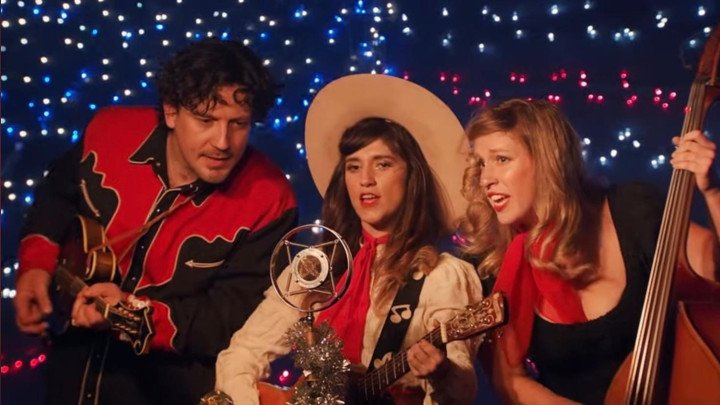
Until that moment I lived some version of the “American Dream”. I moved to Nashville in 2017 and soon found myself touring the United States with Sierra Ferrell, an up-and-coming country singer who was quickly becoming one of Nashville's rising stars. It was the gig everyone wanted and, somehow, it had landed in my lap. I was flying to the Dominican Republic, being driven around in golf carts, and playing festivals with the likes of country music legends like Emmylou Harris and The Avett Brothers. I spent my spare time honky-tonking at Nashville’s American Legion Post-82, hopping between different bluegrass jams in town, and posting on Instagram for an ever-increasing audience who were seemingly taken by the old-fashioned country asthetique.
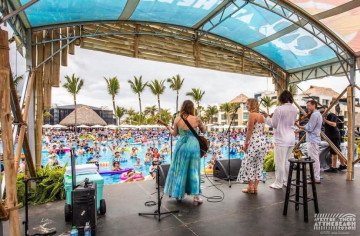
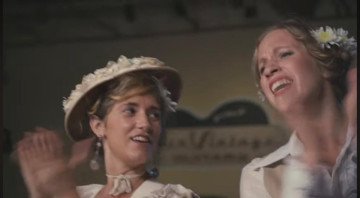
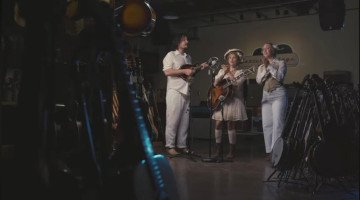

Covid-19 ended my days with Ferell, and live music in general, and I went back to working in my family’s real estate business and playing the occasional gig around town. On February 23rd life found me exactly there—working the door for a friend's show and getting ready to call it a night before work early the next morning. I turned to my friend at the time and said something like, “Oh my god - World War Three has just started.” The full-scale invasion was for me, and many Americans, a wake-up call from the post-covid brain fog that had left most feeling apathetic and domestically-focused.
In the days that followed I was glued to the news. Embarrassing though it is, before the invasion I would have struggled to locate Ukraine on a map. Places like Kyiv and Mariupol were utterly foreign to me and yet now had become the focus of my attention. I was horrified by images of crowded train platforms, packed with people desperate to escape to safety, or of small children hiding in subway stations. These photos could have been taken in New York City.
The news became full of stories of everyday people heeding President Zelenskyy’s call for international help. I read one story about H.U.G.S, an ad-hoc father-son volunteer outfit from Canada who was operating in Ukraine. I sent them $100 and a message on Instagram, “Could I come volunteer?”
On April 21st, 2022, I arrived at the Polish-Ukrainian border at Medyka and began working with HopeFull (formerly Siobhans Trust), a small Scottish charity that was cooking food, mainly pizza, in a tent at the border for refugees. The organization had arrived within the first week of the invasion and cooked around the clock for the hundreds of thousands of Ukrainians who came through the border on foot fleeing the war.
By mid May, the border had become quiet and it became apparent that the need lay inside of Ukraine, and so the charity went with it. There was so much uncertainty in those days that even the prospect of going to Lviv seemed terrifying.
Entering Kherson
Six months later I was seated in the front of a pizza truck entering Kherson for the first time, far from safety and even further from Lviv. A billboard on the side of the road read in Russian “Vote yes for the referendum”—comically it had left out the “no” option. Less then two months prior Russia had held a sham referendum used to justify its illegal annexation of Kherson.
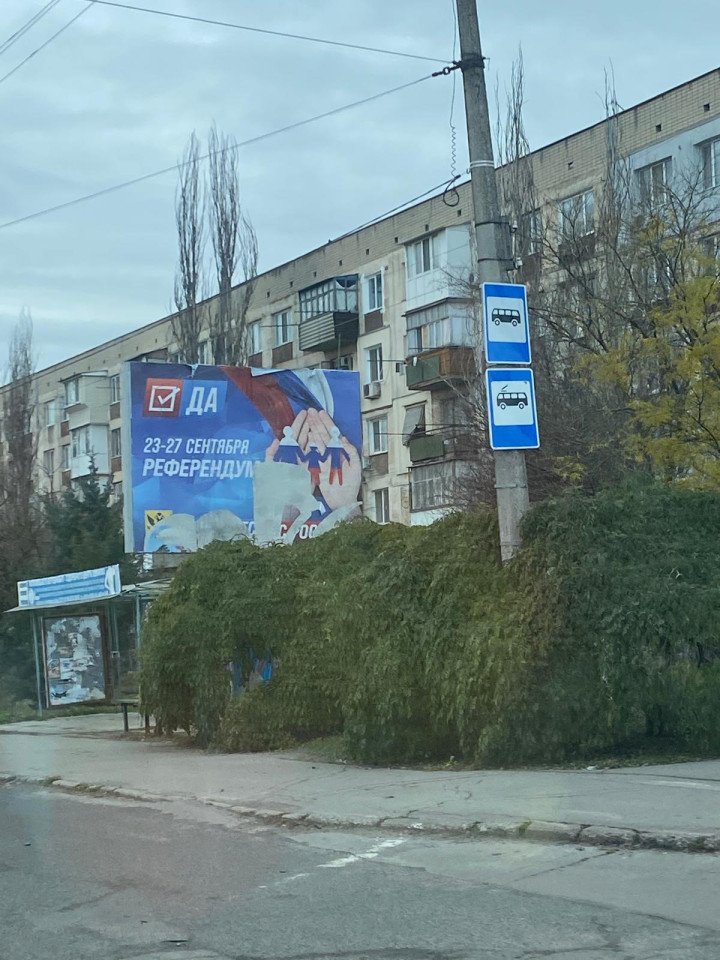
As our convoy pulled into the center of the city, I saw the main square, it was the same one that had been shown all over the news over the last week, where people had gathered waving flags and celebrating the liberation. There was now a newly erected hospital tent and rows of port-o-poddies. A policeman knocked on the window and told us that unfortunately for safety reasons we would have to cook down one of the side streets. The immediate days after the liberation had been quiet but Russians had now begun furiously shelling the city. If they couldn’t have it, no one would.
Cooking pizza is hardly a dangerous job—we weren’t exactly on the top of Putin’s kill list—but what made it so inherently risky was that its sole purpose was to gather people. For us, it was about bringing the community together, for Russians it was an easy target.
As I got out of the van I was suddenly pinned to the side of it by the advancing crowd. In their desperation, people had begun to swarm around the trucks. There had been no electricity or running water in the city for over a week—it had all been destroyed during the retreat—and people were hungry. As I looked out at the crowd, I saw a sea of tired eyes. With no running water, there was no way to bathe, and people's hair was greasy. The initial excitement for the liberation had worn off and a major humanitarian crisis had begun.
With the help of the police, the crowd formed a line and we set up our kitchen. We only had 10 ovens and there were thousands of people. The line stretched all the way down the avenue—it was going to be a long day.
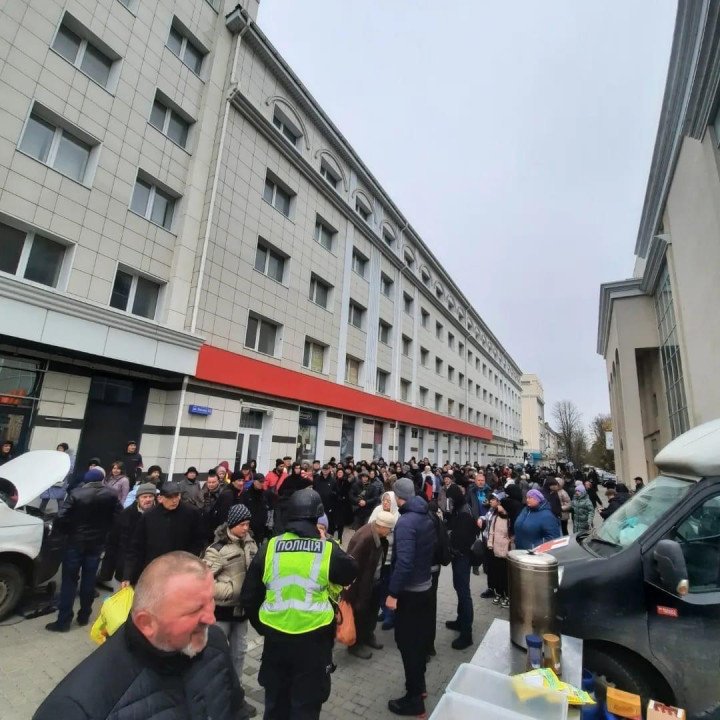
Suddenly I heard an all too familiar thud and then the beeping of car alarms—a bomb had just landed nearby. “Turn up the music!” someone yelled. It’s been a hard days night, and I’ve been working like a dog—the sound of the Beatles drowned out the car alarms and just like that the atmosphere was transformed. With each subsequent boom we turned the music louder.
Several women came up from the crowd and began helping us unwrap the pizzas. That’s the Ukrainian way—no matter how much you try to help them, they’ll always find a way to help you. It’s a culture of incredible generosity. I’d experienced this at countless pizza distributions before, where, even though I came to give pizza, I somehow ended up leaving with a handful of chocolates and gifts.
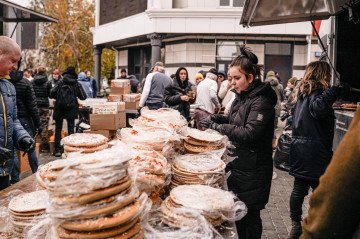
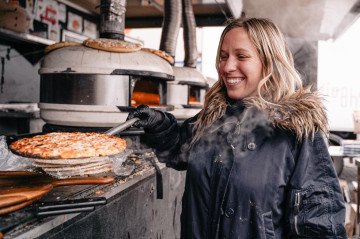
Soon, the kitchen was in full swing. Stacks of pizzas lined the prep tables, with chefs cramming two or three pizzas into each oven, while the servers worked to energize the crowd. Being a Scottish charity, many of the volunteers wore kilts, some in Ukrainian tartan, while kids perched on their parents' shoulders to catch a glimpse of these “crazy Scotsmen” dancing to Beatles songs as they cooked pizza. People waved Ukrainian flags and flashed peace signs. After all, the pizza was always just a means to an end—a way to bring people together in a joyful moment, despite the war.
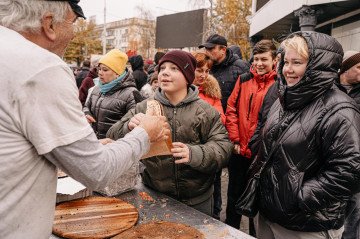
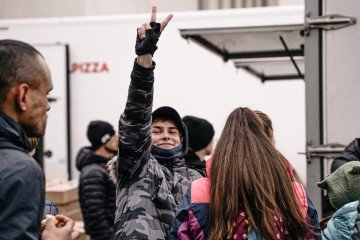
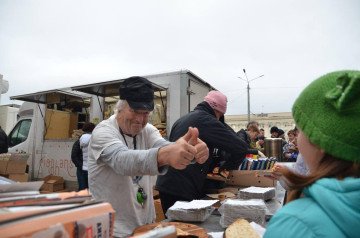
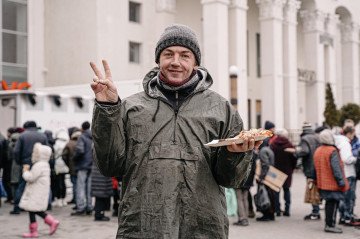
About halfway through the day, I stepped out of the field kitchen and onto the street to take in this historic moment. As I walked out of the range of the music I heard another giant thud come down. I nearly jumped out of my skin and yet no one around me seemed to flinch at all. You often see this near the front line—how quickly people can normalize something as extreme as bombs, and how dangerous it is when your sense of what’s safe becomes distorted in the process.
I stepped to the far side of the crowd and watched my fellow volunteers with pride at work. Everyone was fully engaged, driven by the clear understanding that there was a real need. Helping others is like a high—it’s something that gives us a sense of purpose and satisfaction.
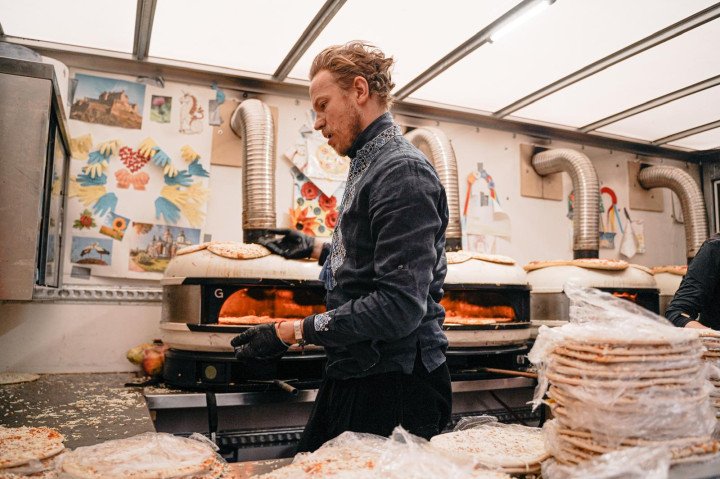
A woman tapped me on the shoulder and started speaking to me in words I couldn’t understand. “How are you?” I asked her using my Google Translate. She answered something along the lines of, “What do you think? Everything is shit.” I realized what a dumb question it was. Later in my volunteering, I learned that asking someone “How are you” is a big no-no in this kind of environment. Culturally the instinct is to answer “good” or “fine” and you never waned to make someone feel that they have to pretend everything is okay.
“Do you need pizza?” I asked her. It was another stupid question. “No, I need money,” she said. I didn’t have money but I rolled her a cigarette and we sat puffing away together looking at the crowd. She explained what life had been like under Russia, how she had no work and no way to buy any food. I listened trying to imagine the world she described and what liberation had been like.
Members of the Hospitallers Battallion remember entering Kherson on the first day of its liberation feeling anxious about what they were about to see. “For me it was scary, painful, difficult but exciting. Scary—because we knew there would be a lot of losses…Exciting because we were liberating our people,” one medic who goes by the call sign Lucky said. She describes residents as being traumatized but also happy. “They cried, gave us hugs and kisses, took photos with us..that is all I can say…I’m glad I was a part of [the liberation] but at the time I did not feel proud…we just did our job.”
After our cigarette, I meandered back towards the kitchen…When I find myself in times of trouble, Mother Mary comes to me. Speaking words of wisdom, let it be. I let the words of the song wash over me and a wave of salty tears came running down my face with them. And when the broken-hearted people living in the world agree, there will be an answer, let it be. It wasn’t sadness or joy, but a profound gratitude. The liberation was a shift in the prospect of the war and the odds for Ukraine were looking up. All of the work, all of the loss, it was all for something. For once it seemed like good would actually win over evil.
That day, more than 40 bombs were dropped on the city. In the following days, Russian forces continued their bombardment, launching 40, 50, even 60 bombs a day. Sadly, Kherson has continued to endure relentless attacks ever since. The next June, Russian forces would bomb the Kakhovka dam, causing an environmental disaster that claimed thousands of lives and destroyed billions of dollars in infrastructure. In addition to the ongoing shelling, the city is now being terrorized by drones dropping antipersonnel mines on civilians walking down the street.
Liberation and its aftermath
I’ve returned to Kherson several times since its liberation, and it’s no less frightening. Those who have stayed describe living like mice, constantly darting from home to the shops, always trying to avoid drones or bombs. On one of my recent trips with the charity, we brought our traveling pizza party to a small village east of the city. A young girl not much older than eight took out her phone, “When you’re here, it’s not scary,” the phone read.
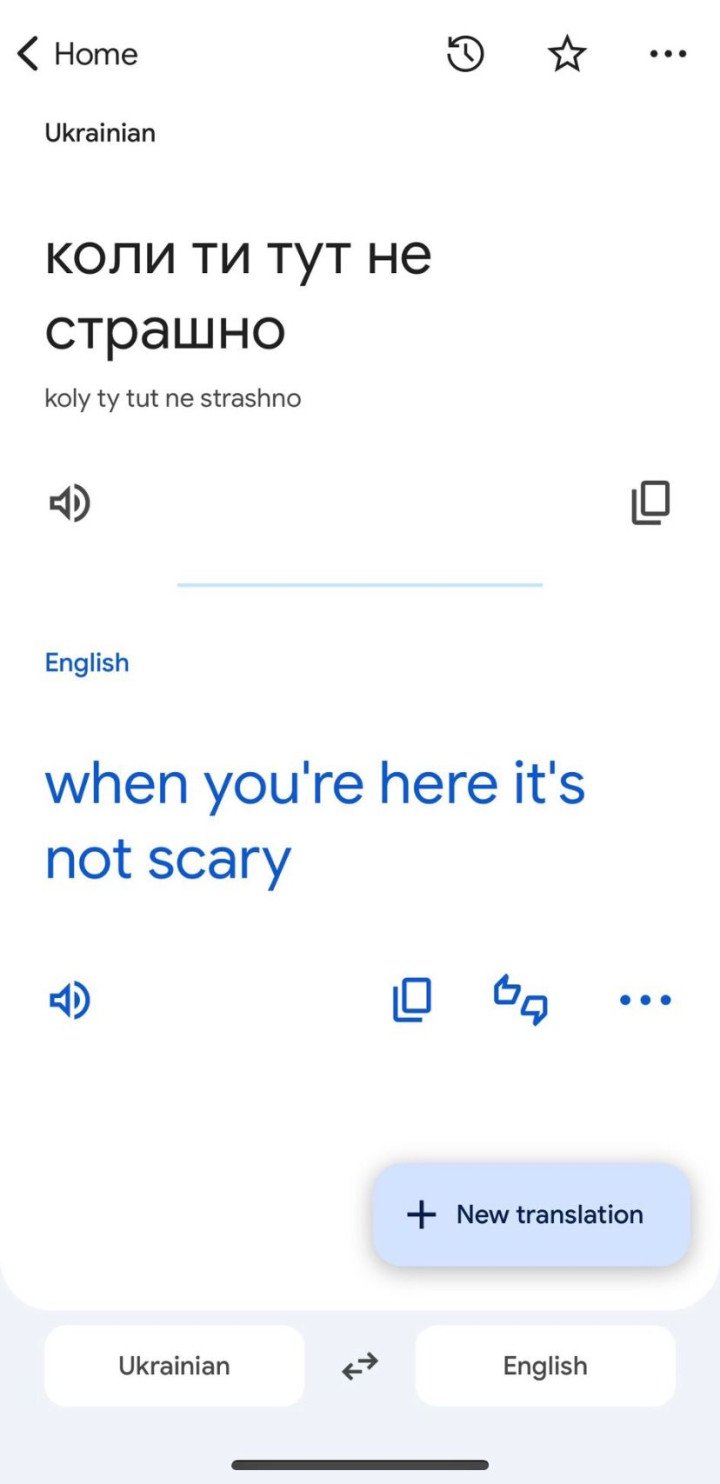
The liberation of Kherson marked a turning point in the war, yet its aftermath has been marked by an unrelenting struggle. The horrors of the initial Russian occupation, with its systematic destruction and daily terror, have left an indelible mark on the city and its people. Even after liberation, Kherson's residents have been subjected to constant bombardment, making it clear that the fight for peace and stability is far from over.
Returning to Kherson has allowed me to see both the brutal cost of the invasion and the incredible resilience of its people. The city, though liberated, remains in a state of siege. The streets may not echo with the cheers of freedom as they did in the immediate aftermath of Russian retreat, but the determination to survive and rebuild is palpable in every corner. The everyday acts of normalcy—whether cooking a meal, sharing a cigarette, or comforting a stranger—take on a new, almost sacred meaning in the face of war's overwhelming presence.
In the months and years to come, Kherson will need more than just physical reconstruction. It will require a rebuilding of its collective spirit, a reclamation of hope, and a restoration of its place in a peaceful Ukraine. The process will be long, but if there is one thing Kherson’s people have shown, it is that they are not easily broken.
As I continue to return, each trip only strengthens the conviction that while war may tear down buildings, it cannot easily shatter the will of those who stand to rebuild. The journey ahead for Kherson—and for Ukraine—will be challenging, but it is one marked by the courage, unity, and unyielding will of those who refuse to surrender. The liberation of Kherson may have been a victory, but its true test will lie in the years ahead, as the city and its people rise from the ashes of war and reclaim their future.
UNITED24 is raising funds to rebuild Ukraine. Donate now to help restore homes, lives, and hope.
-fca37bf6b0e73483220d55f0816978cf.jpeg)
-2c683d1619a06f3b17d6ca7dd11ad5a1.jpg)

-da3d9b88efb4b978fa15568884ef067f.jpg)
-73e9c0fd8873a094288a7552f3ac2ab4.jpg)
-f3bede69822b36ac993a6cd5b65014f9.png)

